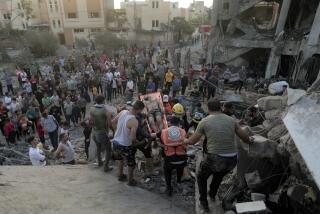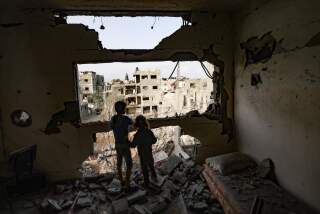A Ruined School Appeals for Help
- Share via
BAGH, Pakistan — Biology professor Afdab Khan climbed atop the dusty ruins of a toppled computer lab at the Boys Postgraduate College here, as if searching for the highest ground to send out a message he hopes will span the globe.
All 20 buildings on this leafy college campus were destroyed in last month’s earthquake, which killed 60 students and severely wounded scores more.
Khan, who knew many of the dead boys, wiped his eyes and made a personal appeal: He wants biology professors and other educators in the U.S. and elsewhere to assist a fellow teacher in the biggest challenge of his life.
“Please consider our plight,” he said. “We are all educators. Please imagine how it would feel to lose your school and many of the young men whose lives you have tried to shape, to pull their bodies from the rubble. Our school is gone. But we have the will to continue our educational mission.”
For weeks, Khan and other professors have sat around a makeshift campfire on their battered campus, applying their collective imagination to devise a way to reopen their school.
Public buildings collapsed and homes were ruined all around them in this provincial city in Pakistani-controlled Kashmir. On every street, they know, devastated residents appeal for aid and funding from international relief groups pouring into the region.
In such a cacophony of misery and need, the teachers wondered, how could they get the word out about their plight? They decided to reach out to faraway colleagues.
“We know that many major universities in the United States and other places have big budgets,” said Sardar Muzfar, principal at the school that once shepherded 1,200 students ages 15 to 21. “We hoped they might take heart when they hear the story about our small school.”
Relief officials say the college has come up with an idea that might be used across this earthquake-struck region -- a sponsorship program in which institutions worldwide could adopt ailing schools and hospitals here.
“These professors have struck upon something that’s extremely refreshing,” said Amanda Pitt, a spokeswoman for the United Nations Emergency Relief Center in the Pakistani capital, Islamabad.
“Pakistanis are a highly educated and hard-working people who aren’t used to looking for assistance. These professors are sending an international mayday among colleagues,” Pitt said.
Like the rest of Pakistan, the educators are still in shock. With many wearing a shalwar kameez, the traditional loose-fitting Pakistani suit, they sat around a fire under the shade of the eucalyptus and acacia trees.
Slowly, the old colleagues began to commiserate. They shared stories of students lost. Like the debate team leader they hoped would one day return and join their ranks as a professor. And the impetuous 17-year-old who excelled at both cricket and soccer and still found time to maintain his grades. And the young computer whiz they all believed would become the Bill Gates of Pakistan.
They took turns explaining how proud they were of their 20-year-old institution, which trained many of the region’s political leaders. Last year, its cricket team was honored as tops in its division.
“It took us time to come to terms with the fact that everything was lost, the world we knew was gone,” said Kosar Shah, a political science professor with a neatly trimmed beard and Western clothes. “We knew the young people and the possessions we lost. We vowed to start from scratch.”
Then their focus turned to the future. They wanted to start classes again. The government has promised them 40 tents but so far has delivered only one, which they use as an administrative office.
Still, the teachers say that in the coming days, they will begin holding classes, outside if necessary. “We will teach until it is too cold to teach,” said Muzfar, 52, who is also a political science instructor.
The professors offered a brief tour of a campus that once housed a dozen departments, including biology, commerce and history. There were dormitories, teachers’ quarters and an administrative block -- places that students and faculty alike once considered home.
“This was our student dorm -- now it’s totally gone,” Muzfar said. Pausing to pick up a student’s discarded notebook, he suddenly went quiet.
The group scaled the wreckage of the old computer building where 30 students lost their lives, examining the shards of computer monitors buried in the rubble and a textbook titled “Introduction to Databases.”
Behind them, several Pakistani soldiers continued the grim hunt for bodies.
Khan produced a slip of paper and scribbled the e-mail address of his school: baghcollegehotmail.com. He said he had never been to America.
“The only doctor I know is Dr. Watson,” he said, referring to the character in the Sherlock Holmes novels. “And I don’t even know if he was a teacher. I have much to learn.”
More to Read
Sign up for Essential California
The most important California stories and recommendations in your inbox every morning.
You may occasionally receive promotional content from the Los Angeles Times.














